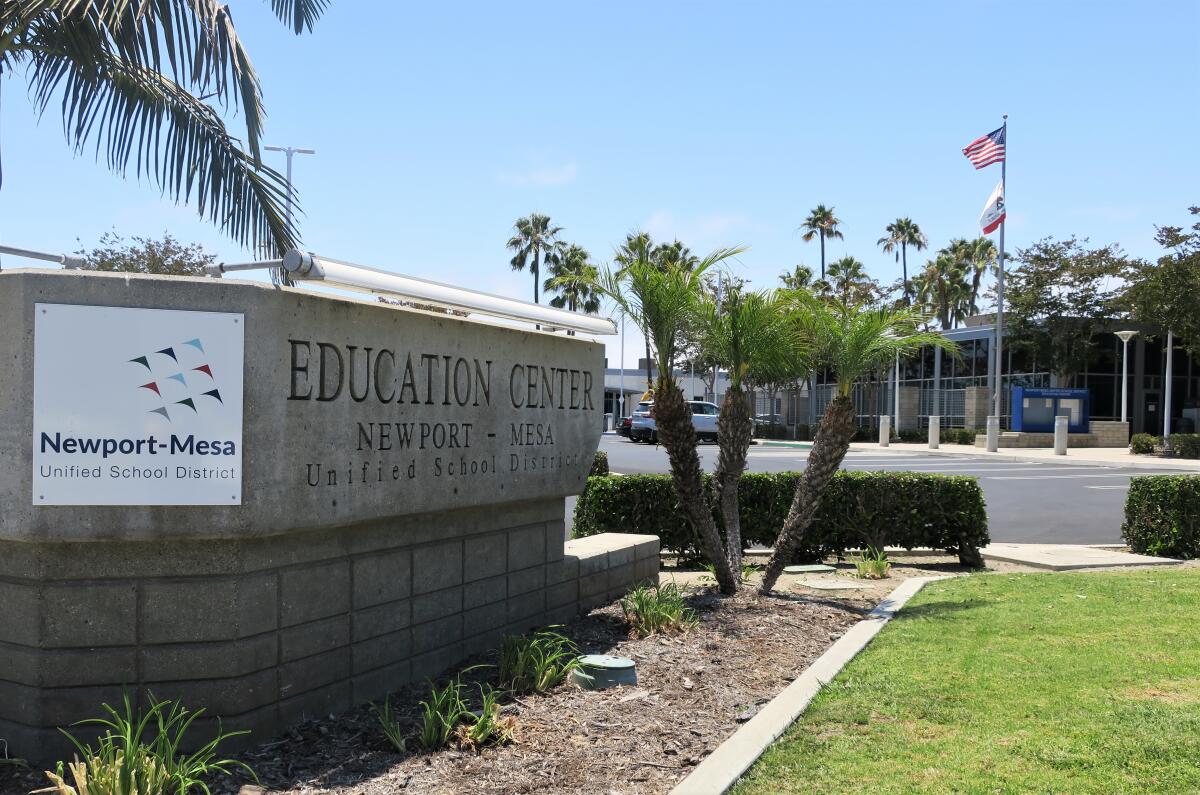Newport-Mesa Unified officials hold off on anti-bias training as some decry critical race theory

Amid parent concerns about critical race theory being brought into classrooms, Newport-Mesa Unified School District officials recently tabled a discussion on continuing a series of anti-bias trainings offered by the Anti-Defamation League, saying more research was needed.
Trustees at a July 13 meeting were set to consider a contract with the New York-based nonprofit — which provides training on promoting diversity and confronting racism and other forms of bigotry — for 25 secondary school training sessions in the year ahead at a cost not to exceed $38,600.
Courses offered for educators, school employees and, in one case, student leaders under the league’s “A World of Difference” program would explore bias, the dynamics of power, privilege and perspective and combatting bullying.
Similar trainings had been offered before the pandemic, under the aegis of NMUSD’s Human Relations Task Force, and the latest contract aimed to continue and build upon those sessions. But board members decided to hold off on discussing a new contract with the Anti-Defamation League, saying they had more questions about course content.
“I think we need some more information,” said Board President Karen Yelsey. “[This] has language that we had not seen before, and I think it creates issues in our community and we need to do a little bit more research.”
Several parents in public comments urged trustees to deny the contract, fearing it would promote a curriculum that categorized students as victims and oppressors based on their skin color.
Costa Mesa resident Haley Jenkins questioned the appropriateness of bringing trainings from the Anti-Defamation League, which describes itself as a global leader in exposing extremism, to Newport-Mesa campuses.
“Are we seeing extremely violent hate crimes occur on campus? Or is this the result of a very small group of people on your task force … pushing critical race theory in our schools?” Jenkins asked board members. “I was assured critical race theory was not in our schools, but here it comes.”
A scholarly approach to looking at American history and jurisprudence through the lens of racism, critical race theory was developed in the 1970s and 80s as a way of trying to understand why, if certain protections and civil rights exist within the law, inequality seems to persist.
In recent months, the approach has been taken from an academic context and placed into a political one, as conservative politicians rally against critical race theory being taught in schools, where antibullying and anti-discrimination lessons have existed for years.
Kaaryn Gustafson, a UC Irvine law professor and director of the law school’s Center on Law, Equality and Race, said while the theory is more of a lens, or a way of thinking about or studying race and inequality, it has recently become a political dog whistle used to foment discontent.
Despite its name, she continued, there is no one singular agenda or theory to put forth.
“The scholars who wrote in the area came from different scholarly backgrounds,” Gustafson said. “[They] were trying to examine what it is beyond just law that allows racism to continue — our culture, history, the refusal to grapple with our history.”
Still, certain repeating themes arise, including the idea that all people have agency in perpetuating or dismantling racist systems and should remain aware of privilege and personal blind spots that may impede understanding.
Gustafson said while debates over critical race theory may be ramping up in the realm of K-12 education, the opposition seems primarily political.
“It’s always helpful to have a bogeyman in politics. And the bogeyman of today is critical race theory,” she added. “It’s convenient, it smacks of indoctrination and it’s tainted with issues of race.”
The Orange County Board of Education will host two community panel discussions on ethnic studies and critical race theory on July 27 and Aug. 24 in its board room in Costa Mesa. Meanwhile, the county’s Department of Education is hosting a virtual colloquium on ethnic studies and California’s model curriculum Wednesday at 2 p.m.
NMUSD trustees said at their July 13 meeting tabling the contract with ADL would give them more time to understand whether the training sessions were similar to those given in the past or might contain new material for their consideration.
“I don’t want to decide on something without fully knowing what I’m deciding on,” said Vice President Michelle Barto. “What we put in place was great. I think it had its purpose and if it’s still fully that, that’s great. But I want to make sure it’s actually that.”
All the latest on Orange County from Orange County.
Get our free TimesOC newsletter.
You may occasionally receive promotional content from the Daily Pilot.




